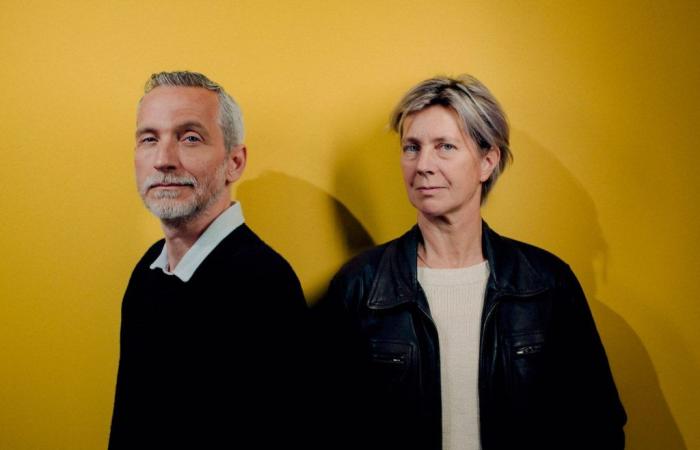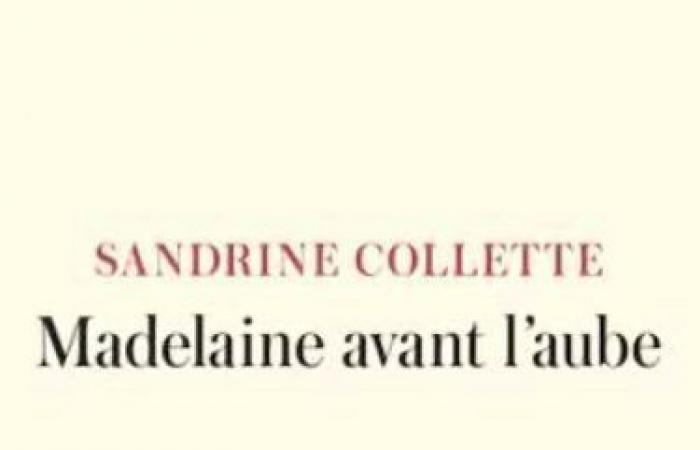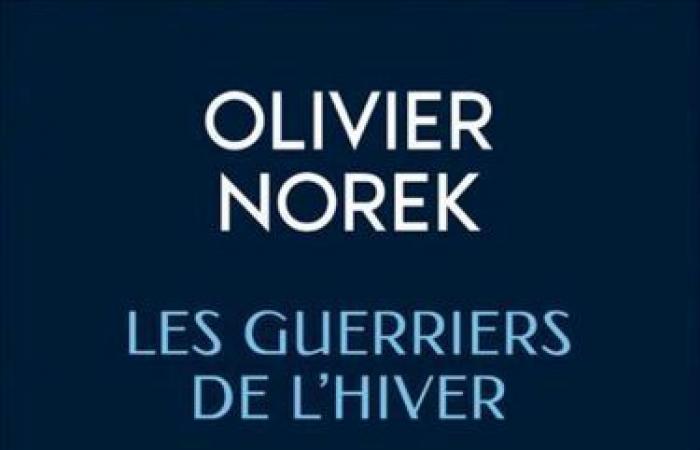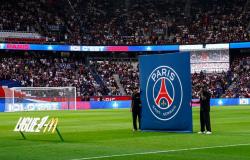He spent more than fifteen years in the police and was a lieutenant of the PJ in Seine-Saint-Denis, while she, who holds a thesis in political science, was a long-time lecturer at the University of Nanterre. . Winner of the Grand Prix for detective literature from her first book in 2013, Sandrine Collette has, for four titles now, made a shift towards white literature, in other words the “classic” novel. Going so far as to obtain, two years ago, the Renaudot prize for high school students for “We were wolves”. That his formidable “Madelaine avant l’aube” appears in the first list of Goncourt 2024 is therefore only half a surprise.
On the other hand, the presence among the selected ones of Olivier Norek, author of hard-boiled thrillers, is almost like a bolt from the blue. His “Winter Warriors”, a thrilling story featuring the Finnish sniper nicknamed the “White Death” at the time of the Russian invasion in 1939, is even on the Renaudot and Renaudot lists of high school students! An incongruity? Not really. After Pierre Lemaitre and Nicolas Mathieu, who came from the dark, the fascinating storytellers Collette and Norek confirm that they are just as worthy of entering the pantheon of contemporary letters.
Paris Match. You who come from crime fiction, did you imagine one day seeing your name on the first Goncourt list?
Olivier Norek. Every morning, I tell myself that the fact that Sandrine and I were on the Goncourt list is completely crazy! But there’s no worse pitfall than writing and thinking you’re going to get a prize. We write for completely other, visceral reasons.
Sandrine Collette. The shock is especially when your publisher tells you that you are going to be part of the literary season. I would have rather insisted on not being there. It’s extremely scary: it’s still throwing yourself into the deep end with as much risk of drowning as of being fished out.
The rest after this ad
Does this appointment correspond to a change in mentalities?
O.N. I received a message from Jean-Baptiste Andrea, the author of ‘Veiller sur elle’, the latest Goncourt. He said to me: ‘You see, now the prices are no longer totally stuck in their habits.’ I also think that there was a reflection on the survival of the book, on the need to broaden the audience by looking almost everywhere else, even to thrillers. Even if our two novels are not, and the genre is still not included in these lists. But crime writers have proven that they have no writing deficit, and that depending on the story being told we can all be placed in the same place in the library.
S.C. Olivier and I are helping to erase the boundaries, to show that there is not ‘black’ on one side and ‘white’ on the other, but that more and more authors are on the thread. Labels are very Franco-French, and I tell myself that we are making progress by erasing them.
Perhaps also that the evolution of your style has made you more legitimate in the eyes of the Drouant jurors?
O.N. Has my writing changed with ‘The Winter Warriors’? I don’t think so. It’s not better written. The only change compared to ‘Brumes de Capelans’ is that there is no cop, crime scene or DNA analysis.
S.C. My fourth book, ‘He remains the dust’, which was more of a noir novel, is for me one of those that I have written best. The difference is visibility, I realized this with my previous novel [‘On était des loups’]. The fact of no longer being categorized as ‘thriller’, despite everything, opens new doors. Particularly in translation…
O.N. However, Sandrine and I, when we write about it, it is never for the sole pleasure of chasing a killer. We always tell something else through that. The thriller is the setting, the investigation, the alibi. Behind us, what interests us is this infinite and unfathomable web of humanity.
S.C. There are also convictions, commitments, which we transcribe through dark novels. We’re talking about the human soul… which hasn’t progressed much.
Sandrine Collette
Paris Match
/
© Dorian Prost
Profile: Sandrine Collette
2013 Release of his first novel, “Des knots d’acier”, which won the Grand Prix for detective literature.
2016 “There remains the dust” wins the Landerneau Polar prize.
2020 “And Always the Forests” receives the Closerie des Lilas prize and the RTL-Lire grand prize.
2021 “Those storms.”
2022 Renaudot Prize for high school students for “We were wolves”.
We claim the right to imagination. Like the reader, I want to escape, not find my own problems
Sandrine Collette
What remains dark about both of you is continuing to confront head-on the cruelty of man, the horror of death, right?
O.N. It is above all thanks to darkness that we see the light, if there is a glimmer in a deeply dark novel, then it becomes explosive, blinding. And there’s a kind of exhilaration at that moment.
S.C. Both of us also refrain from doing violence for violence’s sake. It must have meaning, it must allow us to deal with a theme. Olivier, what you said amuses me because it reminds me of a painting by Pierre Soulages, which, at first glance, seems completely black… except that at the end there is a small golden square, and we can no longer see than that.
O.N. At the church of Conques, when the painter from Rodez installed his colorless stained glass windows, we all got a little upset… A church is already dark. But when the sun hits it, the person with you says: ‘Look, there’s a little bit of yellow.’ Another retorts: ‘No, it’s purple.’ And then you say to yourself that it’s incredible: it’s ‘black’, and Soulages has managed this magic trick of making it something else. What if we too did something else with black in literature? Perhaps this is our path.
We also focus on the strength of your characters, who are nevertheless very different: one, a sniper, the other, a little girl…
S.C. These are ordinary people who are put in extraordinary situations. There are some who become cowards, losers, collaborators. Others become these people, absolute heroes or little girls in rebellion.
O.N. The good character is always the one who is absolutely not made for the mission asked of him. He will have to sublimate himself, and become ultra-endearing, whether he succeeds or not.
S.C. We don’t care about superheroes. What interests us is the nuance, the gray. Not black or white.
The thriller has the reputation of being an effective genre, with nervous writing and narration. At the expense of style?
S.C. Pierre Lemaitre and Nicolas Mathieu have proven the opposite.
O.N. Perhaps with our respective new books we take the time to be more contemplative. The Winter War, namely the action, the bombings, begins, for me, on page 110. This setting up is the meeting with your pen. Besides, I absolutely didn’t see the beginning of Sandrine’s novel go by, even though there is only one horse and three huts! From the first pages, Sandrine tells us: ‘You will read as I have decided.’
S.C. It’s true that the setup is sometimes long, and we must not get bored. Books can fall out of your hands… But I have the impression that the story we have imagined imposes the writing we will find. At the moment we begin, there is a sort of transcendence, something that escapes us.
Nature plays a big role in your novels, it is beautiful, raw, wild. Do we have to find the words to convey it?
O.N. The landscape commands. In my first book, ‘Code 93’, things go in all directions, so the writing is obviously very fast… But when I find myself in Finland at -50°C, with almost frozen men, she is a slightly paralyzed. And under the mist of Saint-Pierre-et-Miquelon, muffled. The feather is a tuning fork.
S.C. I think it’s because we have the ability to visualize our history. I see my book before writing it. And I then transcribe what I see into images.
What you have in common, isn’t it above all that you are storytellers? Where classic French literature often prefers to tell its intimate dramas…
O.N. Ah, but I don’t care about holidays on the Île de Ré for white literature! There is a difference between writing the other, all the possibilities of the other, and writing one’s navel, for oneself. I’m not interested.
S.C. We are among the authors who claim the right to imagination. And even the duty of imagination. Like the reader, I want to escape, not find my own problems. It’s so much bigger to tell a story than its story.
Olivier Norek
Paris Match
/
© Dorian Prost
Profile: Olivier Norek
1998 The native of Toulouse joins the SDPJ of Seine-Saint-Denis.
2013 “Code 93”, Captain Victor Coste’s first literary feats of arms.
2016 “Surges”, which will win the grand prize for “Elle” readers in 2017, in the thriller category.
2017 “Between two worlds” plunges us into the jungle of Calais.
2020 “Impact”, ecological thriller.
2022 “In the mists of Capelans”, where Coste returns to Saint-Pierre-et-Miquelon.
I could even write romance novels. At 49 I’m single and never knew him
Olivier Norek
You will never do ‘feel good’, anyway?
O.N. Oh, that hasn’t been said!
S.C. Does that tickle you?
O.N. Already, I have been lonely and single for forty-nine years by choice. I’ve never had a love story, so I’m in the best position to write one. And then it’s still 90% made up of slamming doors and tears!
S.C. I have already thought about ‘fantasy’, ‘feel good’, and children’s novels, because writing is a necessity, but it is also a game, a pleasure. The idea is not to get bored in one genre.
Will you ever return to crime fiction? Some readers, Olivier, will demand the return of Captain Coste.
O.N. I think I’m going to close my Captain Coste, because, at some point, the curtain has to fall. But first it’s the idea that takes precedence, and only then do you see where it will be classified.
S.C. I don’t even talk to my editor about this idea. No, we have it in our guts, it lives in us and it parasitizes us. You have to write it down anyway.
If you hear the sentence: ‘The Goncourt 2024 is awarded to…’ with your name, Olivier Norek, Sandrine Collette, will you be delighted in the end?
S.C. I would be more than happy, trembling, moved…
O.N. First of all, being in the selection is great, because it’s recognition. The first thing I did when I was ‘nominated for the Goncourt’ – oh, I love saying that phrase! – is to send an email to Sandrine to tell her that I was super proud and happy for her. And that she would be the only person I wouldn’t be jealous of if she picked it up.
S.C. I told him the same, that his book was great, but that the rest was not up to us. We are perhaps fortunate in that we have kept the spirit of the thriller, a much friendlier relationship between authors than in other places.
O.N. The world of crime fiction is benevolent. I know 37 authors of the genre in France. And I received 37 emails when my selection for Goncourt was announced. This is truly incredible!

“Madelaine before dawn”, by Sandrine Collette, ed. JC Lattès, 252 pages, 20.90 euros.
© ed. JC Lattès
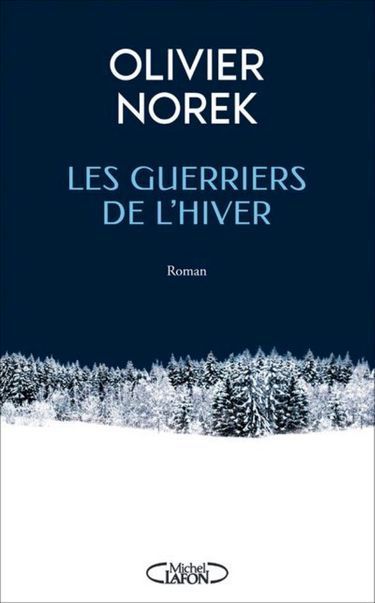
“The Winter Warriors”, by Olivier Norek, ed. Michel Lafon, 448 pages, 21.95 euros.
© ed. Michel Lafon

